Nutramax Dasuquin is one of the most trusted names in canine joint health, recommended by veterinarians across the globe. Think of it as a powerhouse supplement that’s specially crafted to protect your dog’s joints, whether they’re young and active or older and struggling with mobility.
What makes Dasuquin stand out is its unique blend of ingredients that go beyond traditional glucosamine supplements. It doesn’t just mask the symptoms—it targets the root cause of joint pain and promotes cartilage regeneration and inflammation control.
Nutramax Dasuquin Chewables with MSM For Large Dog
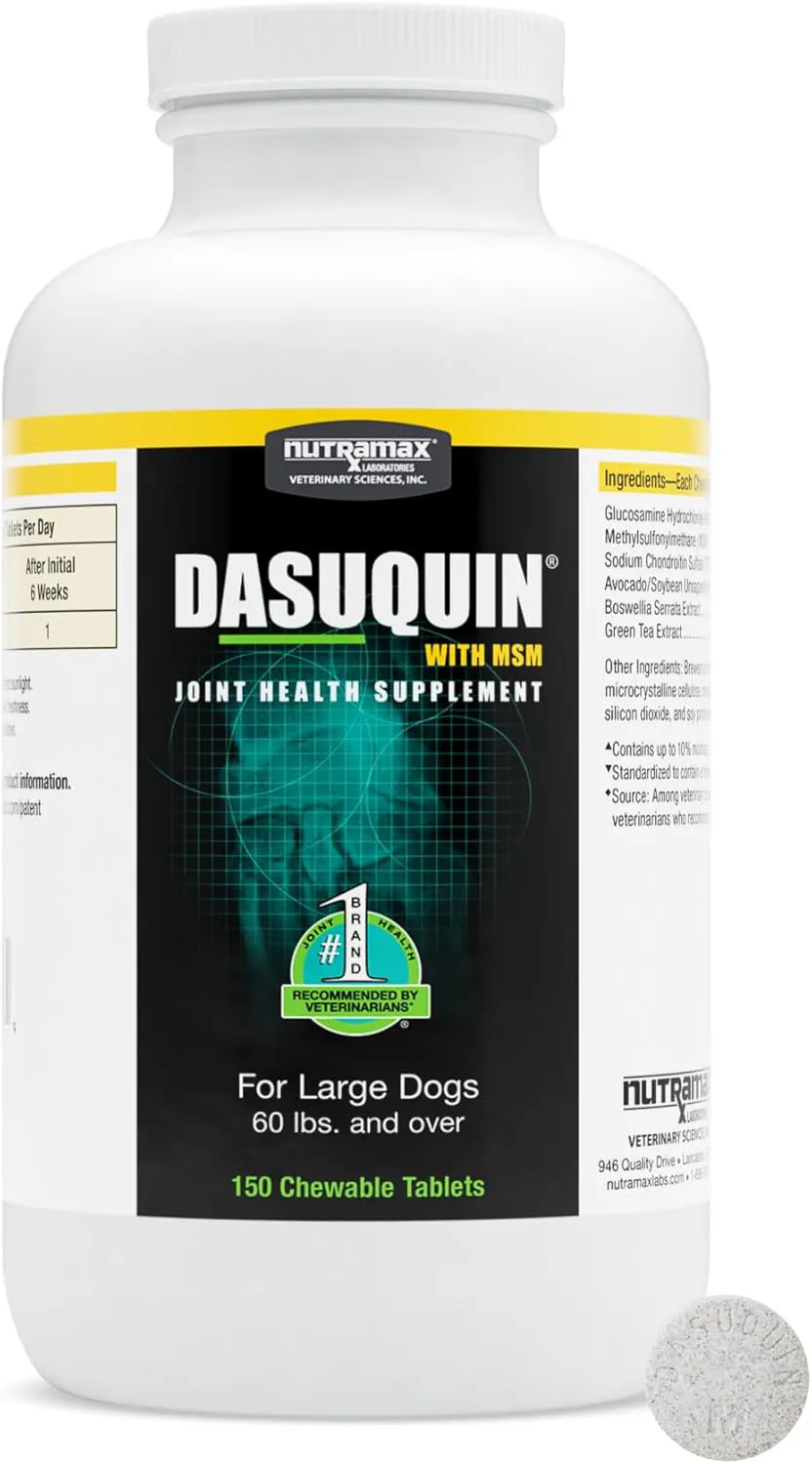
Nutramax Dasuquin with MSM Soft Chews For Large Dog
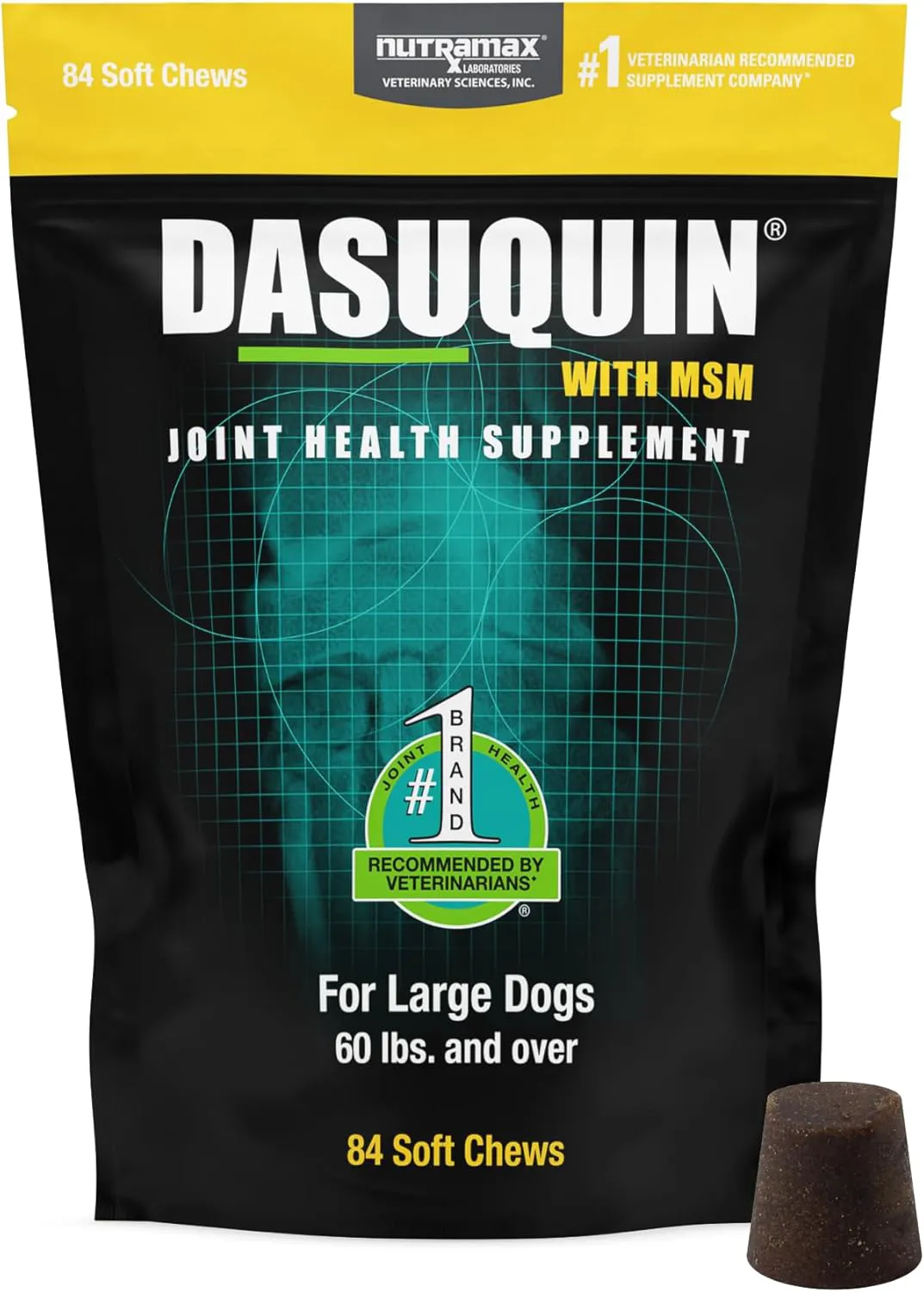
Nutramax Laboratories MSM Chewables for Small, Medium Dogs
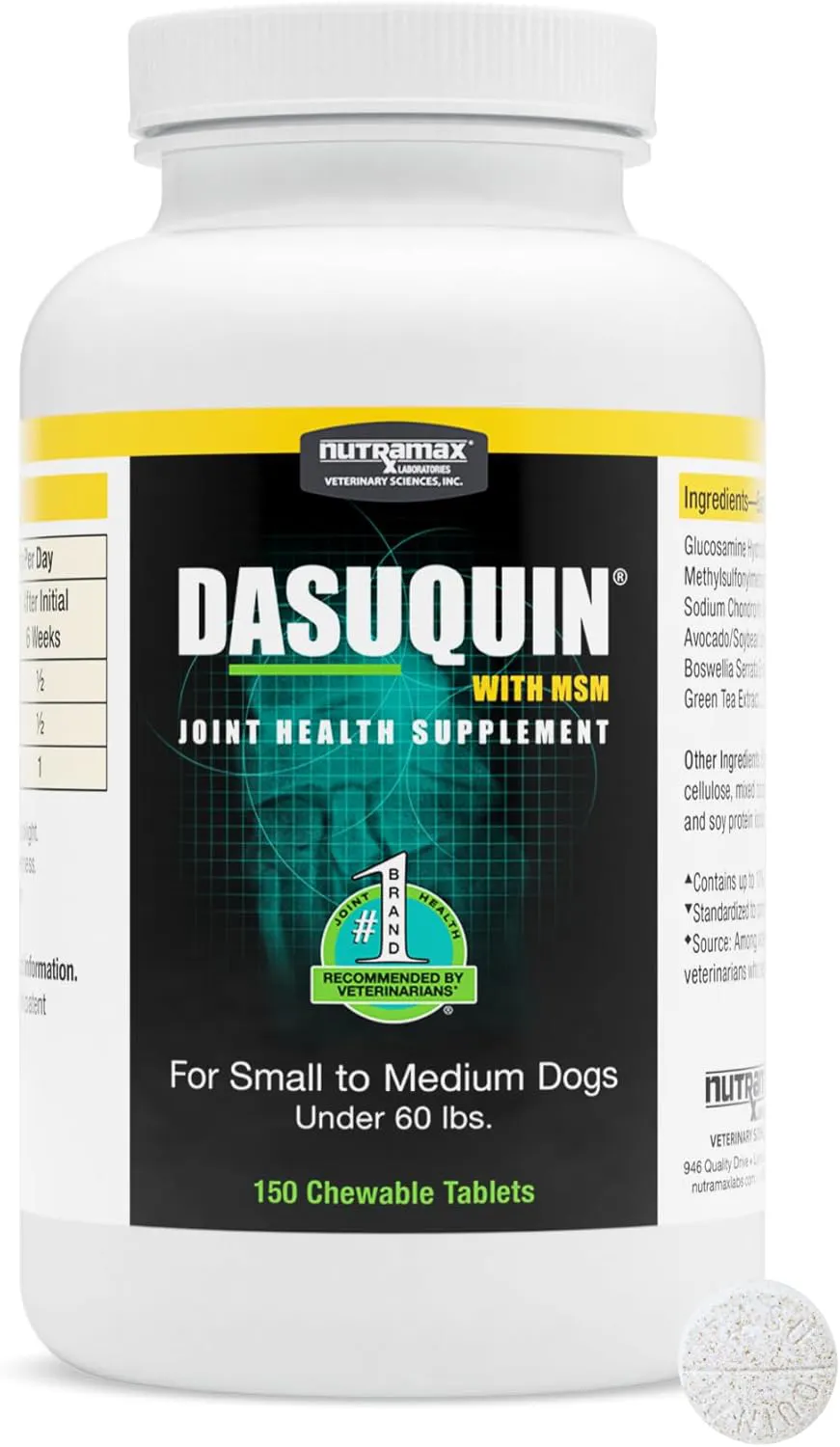
Nutramax Dasuquin Soft Chews for Small to Medium Dogs
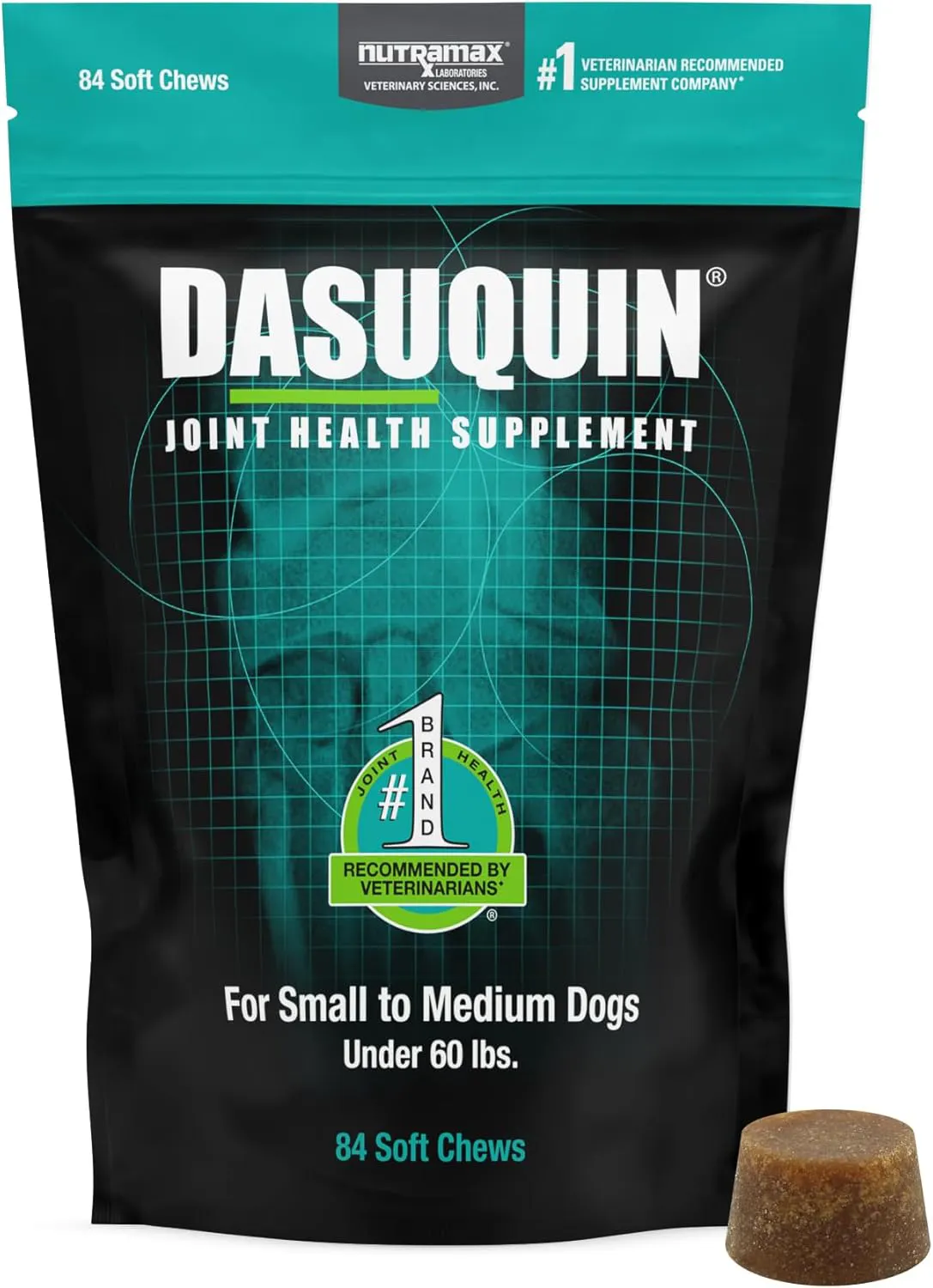
Nutramax Dasuquin Dosage Chart for Dogs
| Dog’s Weight | Initial 4–6 Weeks | Maintenance (After 6 Weeks) |
|---|---|---|
| Under 10 lbs | ½ tablet daily | ½ tablet daily |
| 10–29 lbs | 1 tablet daily | ½ tablet daily |
| 30–59 lbs | 2 tablets daily | 1 tablet daily |
| 60–120 lbs | 2 tablets daily | 1 tablet daily |
Nutramax Dasuquin For Dogs Key Ingredients and Their Benefits
What’s inside a Dasuquin tablet or chew is what truly sets it apart. Let’s break down the key ingredients and what each brings to the table:
- Glucosamine Hydrochloride – This compound helps repair and maintain cartilage, the tissue that cushions your dog’s joints. It’s the backbone of joint support.
- Chondroitin Sulfate – Often paired with glucosamine, chondroitin inhibits enzymes that break down cartilage. Together, they act like joint repair agents.
- Avocado/Soybean Unsaponifiables (ASU) – A plant-based extract that not only supports joint function but also slows cartilage deterioration. It’s a potent anti-inflammatory that enhances the effects of glucosamine and chondroitin.
- MSM (Methylsulfonylmethane) – Found in some Dasuquin formulas, MSM is a natural sulfur compound that reduces inflammation and pain while promoting tissue repair.
- Green Tea Extract – Rich in antioxidants, it combats oxidative stress in joints, which is a common issue in aging dogs.
Dasuquin with MSM vs. Dasuquin without MSM
When exploring Nutramax Dasuquin supplements, one of the first decisions dog owners face is whether to choose a formula with MSM or without it. Both are excellent options, but they serve slightly different purposes based on your dog’s needs.
Dasuquin with MSM includes Methylsulfonylmethane, a naturally occurring compound known for its anti-inflammatory and pain-relieving properties. This version is especially helpful for dogs that are already showing signs of joint pain, stiffness, or inflammation. MSM enhances mobility, eases discomfort, and supports faster recovery in dogs with moderate to severe joint issues or arthritis.
On the other hand, Dasuquin without MSM is designed for preventative care or mild joint issues. It still includes powerful ingredients like glucosamine, chondroitin, and ASU, but it’s better suited for dogs in the early stages of joint wear or younger pups in high-activity households that may be prone to future joint problems.
Some dogs may also be sensitive to MSM, experiencing mild digestive issues. In such cases, the MSM-free version can be a safer alternative. It’s always a good idea to consult your vet when choosing between the two to determine the best fit for your dog’s unique health status and lifestyle.
To summarize:
- Choose Dasuquin with MSM for: dogs with arthritis, visible pain, post-surgery recovery, or older age.
- Choose Dasuquin without MSM for: younger dogs, preventative care, or mild joint concerns.
Both deliver strong joint support, but MSM adds that extra boost for dogs who need more intensive care.
Dasuquin for Small to Medium Dogs vs. Large Dogs
Size matters—especially when it comes to joint supplements. Nutramax understands that a 15-pound terrier has very different nutritional needs than a 90-pound labrador. That’s why they offer distinct formulas based on dog size.
Dasuquin for Small to Medium Dogs is formulated for dogs weighing up to 60 pounds. It contains the same core ingredients—glucosamine, chondroitin, and ASU—but in proportions optimized for smaller frames. Giving a smaller dog the large-breed version could result in over-supplementation, potentially causing stomach upset or diarrhea.
Dasuquin for Large Dogs, on the other hand, is packed with higher doses of each active ingredient to match the increased stress and wear on bigger dogs’ joints. Large breeds are notoriously prone to hip dysplasia, torn ligaments, and arthritis, so early joint care is essential. The large breed formula delivers powerful support without needing to increase the number of tablets per dose.
Choosing the correct size formulation ensures:
- Effective dosing without risk of over/under-treatment
- Better absorption and tolerance
- Cost-efficiency, since you won’t need to split or double-up tablets
Always weigh your dog and read the label before starting any new supplement. When in doubt, your vet can recommend the best formula based on weight, age, and lifestyle.
Dasuquin Soft Chews vs. Tablets
Let’s be honest—giving a dog a pill can feel like a battle. Hiding it in cheese, wrapping it in peanut butter, or sneaking it into a treat doesn’t always work. That’s why Nutramax created Dasuquin Soft Chews as an alternative to traditional tablets.
Dasuquin Soft Chews are a game-changer for picky eaters. They’re designed to look, smell, and taste like treats—so your pup thinks they’re being rewarded instead of medicated. Each chew contains the same essential ingredients as the tablet form, and the dosage is clearly labeled based on your dog’s weight.
Soft chews are especially helpful for:
- Older dogs with dental issues
- Dogs who refuse tablets
- Pet parents seeking convenience
Tablets, however, are a more economical option for long-term use and often have a longer shelf life. They’re great if your dog willingly takes pills or if you have a pill pocket routine that works.
The choice between soft chews and tablets boils down to preference—yours and your dog’s. Both are equally effective, but if getting your pup to take their supplement feels like a wrestling match, soft chews are your best friend.
How Dasuquin Supports Joint Health in Dogs
Dasuquin isn’t just a random mix of vitamins and herbs—it’s a scientifically developed joint health supplement with clinical research backing its efficacy. The real magic lies in how its ingredients work together to protect and repair joint structures on a cellular level.
Here’s how it works:
- Glucosamine acts as the building block for cartilage. It supports the repair and regeneration of worn-out cartilage, helping joints stay cushioned.
- Chondroitin inhibits enzymes that destroy cartilage. When paired with glucosamine, it slows down the degeneration process significantly.
- ASU (Avocado/Soybean Unsaponifiables) is the hero of the formula. It reduces inflammation at the genetic level and enhances the performance of glucosamine and chondroitin. ASU is clinically proven to protect cartilage cells from damage.
- MSM (when included) relieves pain, reduces muscle soreness, and aids in detoxification, which helps eliminate harmful byproducts from joint inflammation.
This potent combination doesn’t just target one part of the problem—it addresses inflammation, cartilage damage, and joint lubrication all at once. Think of it as rebuilding and greasing the joints simultaneously.
Studies conducted by Nutramax and independent researchers have shown noticeable improvements in joint mobility and pain levels in dogs after consistent use. It’s this evidence-based approach that sets Dasuquin apart from other supplements on the market.
How Long Does Nutramax Dasuquin Take to See Results?
One of the most common questions from dog owners is: “When will I see a difference?”
With consistent use, most dogs begin to show improvement within 4 to 6 weeks. However, this can vary depending on the dog’s age, weight, and severity of joint issues. Some pet parents notice subtle improvements in just 2 weeks—like less stiffness or more willingness to go on walks.
For dogs with advanced arthritis or post-surgical recovery, it may take a little longer—up to 8 weeks—to see significant results. The key is consistency. Skipping doses or stopping prematurely can delay progress.
Here’s what to expect over time:
- Week 1–2: Your dog may seem more energetic or less hesitant to move.
- Week 3–4: Stiffness and limping begin to reduce.
- Week 5–6: Noticeable increase in mobility and playfulness.
- Week 7–8: Improved overall quality of life—your dog may even start running again!
Dasuquin is a long-term commitment. It’s not a quick fix but rather a steady path to healthier joints. For chronic conditions like arthritis, ongoing supplementation is typically recommended by veterinarians to maintain results.
Common Signs of Joint Issues in Dogs
Not all signs of joint pain are obvious. Many dog owners miss early symptoms because dogs are naturally stoic creatures who mask their discomfort. But if you know what to look for, you can spot joint problems before they become severe.
Here are common signs your dog may be struggling with joint issues:
- Limping or favoring one leg
- Stiffness, especially after rest
- Trouble climbing stairs or jumping into the car
- Decreased activity or reluctance to play
- Licking or chewing at joints
- Behavioral changes like irritability or lethargy
Sometimes, the signs are subtle—a slightly longer time getting up in the morning or hesitation before jumping. Don’t chalk it up to laziness or aging too quickly. These are red flags that your dog’s joints may be inflamed or degenerating.
Regular vet checkups can help confirm if your dog is experiencing osteoarthritis or another joint-related condition. Supplements like Dasuquin are not only for treatment but also for prevention. Catching these issues early allows you to give your pup the support they need before pain and immobility set in.
Being observant and proactive about joint health helps your dog stay comfortable, mobile, and happy—because every tail wag and zoomie is worth protecting.
Possible Side Effects to Watch Out For
Dasuquin is generally well-tolerated, but like any supplement, it’s not completely free of side effects. Thankfully, adverse reactions are rare and usually mild.
Here are the most commonly reported issues:
- Mild gastrointestinal upset – This can include diarrhea, vomiting, or flatulence, particularly when first starting the supplement.
- Changes in appetite – Some dogs may eat slightly more or less during the first few days of use.
- Allergic reactions – Though rare, ingredients like soy, avocado, or shellfish (from glucosamine) could trigger sensitivities in some dogs.
- Lethargy – A small number of dogs may appear sleepy or less active when adjusting to the supplement.
To minimize side effects:
- Always give the supplement with food
- Start with a smaller dose and gradually increase to the recommended amount
- Use the correct formulation based on your dog’s size and condition
- Monitor closely during the first 7-10 days
If your dog experiences persistent side effects or you notice anything unusual—such as hives, excessive drooling, or severe vomiting—stop use immediately and consult your vet.
Remember, every dog is unique. Just like people, some dogs are more sensitive than others. But in general, Dasuquin is one of the safest joint supplements available and is trusted by thousands of veterinarians and pet owners alike.
You May Also Like:
FAQs
Can Dasuquin be used alongside prescription medications?
Yes, Dasuquin is generally safe to use with most prescription medications, including NSAIDs and antibiotics. Always consult your veterinarian to ensure compatibility with your dog’s specific health plan.
Should puppies take joint supplements like Dasuquin?
Typically, Dasuquin is recommended for adult dogs, but puppies from large or high-risk breeds may benefit from early supplementation. Talk to your vet about preventive options.
How long should my dog stay on Dasuquin?
For chronic or age-related joint issues, Dasuquin is usually recommended for long-term or even lifetime use. Short-term usage is also possible during injury recovery or after surgery.
What if my dog won’t eat the tablets or chews?
Try crushing tablets and mixing them with food or switching to the soft chews version. If the issue persists, ask your vet for flavor alternatives or alternative supplement suggestions.
Is there a feline version of Dasuquin?
Yes! Nutramax also makes Dasuquin for cats, formulated specifically to support feline joint health. Ask your vet if it’s appropriate for your cat’s condition.


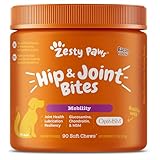






![Can Dogs Eat Blood? 7 Side Effects [Expert Opinion]](https://petskor.com/wp-content/uploads/2022/04/Webp.net-resizeimage-12.jpg)
